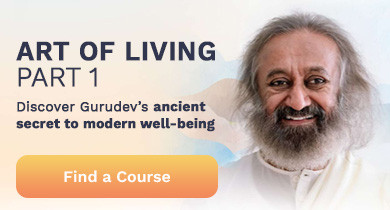By Ketevan Chigogidze|Posted: July 29, 2020
Questions: What is the purpose of reincarnation? Is there a link between our past life and present life? Is there a way out from this circle of life? How do we liberate ourselves from having one rebirth after another, also known as samsara? How many more lives will I have in the future? Is there something I can do in this life to further my spiritual evolution for a future life? How can I avoid taking another body?
Reincarnation, or rebirth, is a phenomenon shrouded in mystery and speculation. Those of us who have given it some thought may have wondered about its purpose or the personal lessons we are supposed to master in our present-day life. As little as we know about reincarnation, we intuitively recognize that reincarnation and karma are somehow intertwined. Understanding a little bit about karma can help illuminate this most unfathomable of topics.
What is karma?
In many of his previous talks, Gurudev Sri Sri Ravi Shankar, founder of the Art of Living Foundation, has explained in detail about the 3 types of karma and what causes them.
It’s important to understand that karma simply means action, whether from this life or a previous life. It could be of 3 different types: (1) karma can be latent and manifest at some point in the future as a result of past actions, it could be (2) present as a current tendency as a result of past actions, or as (3) something that happens in the future as a result of current actions. In other words, latent karma can be understood as impressions or actions from the past that will create similar experiences or actions in the future. This type of karma is known as sanchita karma or the acquired/stored karma which we have brought with us from the past and will take effect in the future. Karma which is responsible for current tendencies is also due to past impressions, with the distinction that the impressions are manifesting right now. This type of karma is known as prarabdha karma. Prarabdha means that which has already begun. Finally, our present actions are determining the karma that we will experience in the future and so the cycle of karma continues. This type of karma is known as agami karma. The chart below can help visualize the type of karma as it relates to the 3 modes of time, with X signifying when the karma originated and Y signifying when the karma will manifest.
Types of Karma
Type of Karma | Past | Present | Future |
Prarabdha | X | Y | |
Sanchita | X | Y | |
Agami | X | Y |
Y – karma manifested
In the Bhagavad Gita, Lord Krishna says “unfathomable are the ways of karma.” True story! Even though we may not fully understand karma, especially with respect to karmas of a past life, we have the sense that as we sow, so shall we reap. Different seeds sprout at different times. An alfalfa seed sprouts in a day or two and can be eaten right away, whereas a mango tree takes a very long time to bear fruit. In addition to individual karma, there is also family karma (e.g. through genes), and collective karma of cities and nations.
Wanting to improve our karma is a natural tendency. In fact, research shows that when we want something good to happen especially when we don’t have much control over the results, we’re more inclined to help others. Instinctively, we know that karmic investment gives us a pay-off at some point in the future, perhaps even in a future life.
How karma relates to reincarnation
Reincarnation means our soul (jiva), or consciousness, comes again into a new body. Our stored impressions, samskaras, and actions (or karmas) definitely have a large role to play in the conditions of our next birth, both with the physical body and the quality of life in general. However, according to Gurudev, it is our last thoughts before death that are the most important in determining our next life. The last impressions in the mind are the strongest and will be the ones that produce the circumstances and situations for the mind to take on in the next incarnation. Positive thoughts, anyone?
How to eliminate karma
What do we mean when we say that we want to get rid of karma? Getting rid of bad karma simply means getting rid of negative impressions in our mind or consciousness which give rise to actions that bind us. However, the attachment to positive impressions is also something that needs to be eliminated to experience true freedom. The first step is to get rid of the negative karma and then we can attend to our attachment to positive karma. A great analogy, courtesy of Gurudev, is how we use soap to wash the body. The soap is like positive karma. Once the body is clean it’s time to wash off the soap! Similarly, once negative karma is eliminated, it’s time to let go of positive karma too. Positive karma is essential so that negative karma can get washed away.
The real skill is to live amidst all karmas yet be unaffected by it- recognizing the stillness in all activity and knowing that stillness is our very existence - and be the witness of all action. We have to keep acting yet not get attached to the action. All habits and all addictions are nothing but karma. All our day-to-day activities produce impressions in our minds. Of the 3 types of karmas, sanchita karma or acquired karma which we have brought with us can be eliminated. Agami karma can also be eliminated. In contrast, prarabdha karma which is already yielding results has to be experienced- this is sometimes referred to as unavoidable karma.
If you are feeling a bit skeptical, unable to embrace a belief in multiple lives, check out this article posted in Psychology Today, Reincarnation Research: Just a Coincidence? If we look deeper into the science of reincarnation, The First Law of Thermodynamics states that energy can be transformed from one form to another, but can neither be created nor destroyed. It makes you wonder how long have we been in existence? And how many times have we reincarnated? Is there such a thing as an immortal soul?
Here are 8 tips to end the cycle of misery
1) Practice self-awareness
Awareness of a particular tendency is the first step in eliminating negative tendencies in ourselves and helps us to overcome undesirable thoughts and behaviors. When you increase the sense of awareness or knowingness in you, karma gets reduced.
2) Act without any feverishness or attachment to the fruits of your actions
One karma (or action) seems to lead to another karma (or action)! That is why karma is seen as a cycle. What is that karma by which we can be liberated from karma? Gurudev says that liberation is attained by Nishkama Karma or action which is done without any feverishness or attachment to the fruits of the action. For example, giving our very best effort in any situation at hand without linking our happiness to the outcome of that effort or action is Nishkama Karma.
3) Nurture a healthy perception of people
Our thoughts and feelings also determine our karma. The more stuck we are to negative thoughts and feelings about our perceived enemies or people who’ve wronged us, the more we imbibe those qualities in ourselves. Whatever we cannot let go of creates deep impressions in our consciousness and these tend to re-live themselves in repeated experiences in this lifetime and next. For our own sake, we must forgive people and give them the benefit of the doubt. As we perceive the world and the people around us, so is our reality. Our perception needs to be expanded to accommodate a healthy acceptance of people and their behaviors.
4) Get rid of bad company
If you keep spending time with very depressed or negative people, you will also feel depressed and negative. We’ve all heard the saying that we are the average of the five people we spend the most time with. If you are in the company of joyful and spiritual people, your karma naturally improves.
5) Have a Guru in your life
Guru is a Sanskrit term for teacher, guide, expert, or master. In Hinduism, Buddhism, Jainism, other religions of the world, it is a widely held belief that one cannot progress and find liberation without the Guru. It is said that a Guru can relieve you of your mistakes and certain karmas.
6) Manage your stress with regular practice of yoga and meditation
Your connectedness with the love that you are, the timeless aspect of your being, takes you beyond birth and death. From a more scientific angle, research in Oslo by Dr. Fari found that there are 300 genes in our system which cause illness and these get suppressed when you do pranayama, Sudarshan Kriya, meditation. In this way, doing certain spiritual practices can help you change the expression of your genes. This can be viewed as changing or optimizing your karma.
7) Don’t get stuck in cravings and aversions
Karma Bandhan (bondage due to actions) is a state where there is some craving or aversion for an action. Broadening our vision helps us understand that even when a craving or desire is fulfilled it leaves us in the same place we were in before we had the desire. Desires don’t take us any further. In fact, they bind us in the cycle of karma.
8) Serve others
Seva, the Sanskrit word for selfless service or volunteerism, is an act that is done without wishing for something in return. Gurudev, states, “Seva purifies our karma." In other words, serving others purifies our actions.
A final word of wisdom is to stop analyzing your karma and worrying about if there will be a ‘next life’ for you, and come to the present knowing that life is new and fresh in every moment! Just relax. To help you relax, manage your stress, and even optimize your karma, attend this FREE Breath and Meditation online session, Beyond Breath, with a live meditation instructor.
Ketevan Chigogidze is a research chemist and Art of Living instructor from Canada. She is devoted to continuously spreading the knowledge of inner peace and happiness.





























